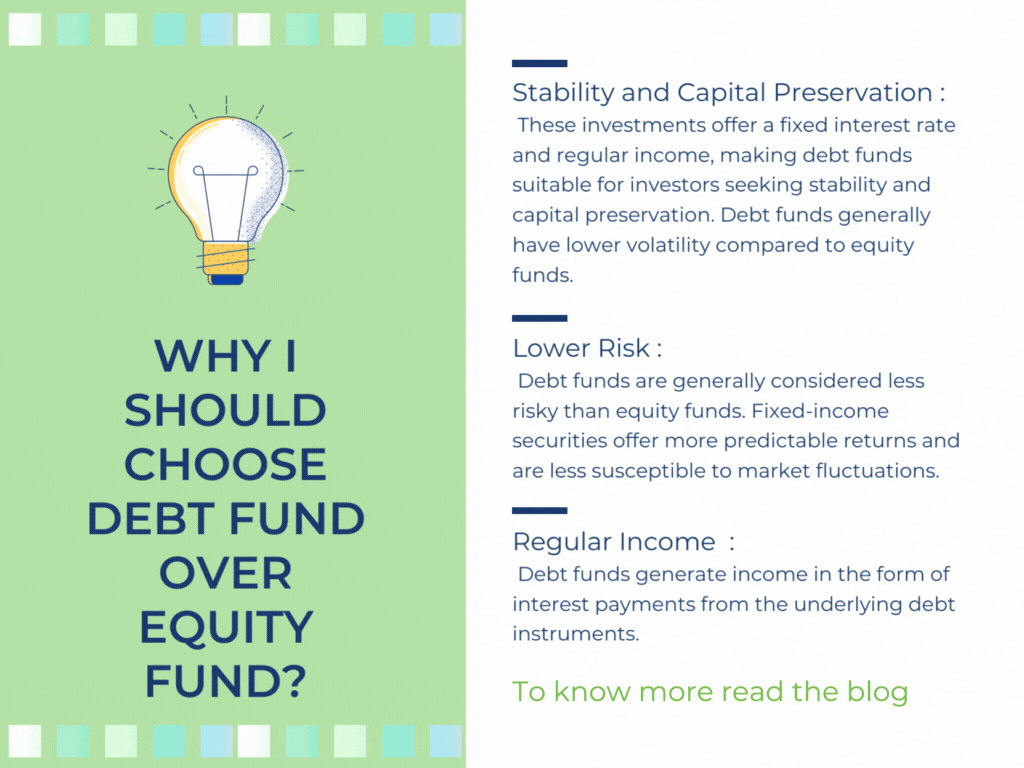Why I should choose Debt fund over Equity fund?
Choosing a debt fund over an equity fund depends on your investment goals, risk tolerance, and time horizon. Here are some reasons why you might consider investing in a debt fund:
Stability and Capital Preservation: Debt funds primarily invest in fixed-income securities such as government bonds, corporate bonds, and other debt instruments. These investments offer a fixed interest rate and regular income, making debt funds suitable for investors seeking stability and capital preservation. Debt funds generally have lower volatility compared to equity funds.
Lower Risk: Debt funds are generally considered less risky than equity funds. Fixed-income securities offer more predictable returns and are less susceptible to market fluctuations. If you have a lower risk tolerance or a shorter investment horizon, debt funds can be a suitable option.
Regular Income: Debt funds generate income in the form of interest payments from the underlying debt instruments. If you are looking for a steady income stream, debt funds can provide regular coupon payments, which can be beneficial for retirees or individuals seeking income generation.
Liquidity: Debt funds typically offer higher liquidity compared to equity funds. It is often easier to buy and sell debt fund units, providing you with flexibility in accessing your invested capital when needed.
Capital Preservation in Bearish Markets: During periods of market downturns or bearish phases, debt funds tend to be more resilient compared to equity funds. The fixed-income nature of debt investments provides a cushion against market volatility, reducing the risk of capital erosion.
Diversification: Including debt funds in your investment portfolio can help diversify risk. Debt funds provide exposure to different fixed-income securities, including government bonds, corporate bonds, and money market instruments. This diversification helps to spread risk across multiple issuers and reduce the impact of any one security's performance on the overall portfolio.
Risk Mitigation: Debt funds can act as a risk mitigation tool in a balanced investment strategy. By allocating a portion of your portfolio to debt funds, you can offset the higher volatility and risk associated with equity investments, potentially providing more stable overall returns.
However, it's important to consider the following factors:
Lower Potential for Capital Appreciation: Debt funds generally offer lower potential returns compared to equity funds. The fixed-income nature of the investments limits the upside potential, making them less suitable for long-term capital appreciation goals.
Interest Rate Risk: Debt funds are sensitive to changes in interest rates. When interest rates rise, the value of existing fixed-income securities may decline, impacting the NAV (Net Asset Value) of the debt fund. Conversely, when interest rates fall, the value of existing securities may rise. It's important to assess the interest rate environment and consider the potential impact on debt fund returns.
Inflation Risk: Debt funds may not be as effective in combating inflation compared to equity funds. Fixed-income returns may not keep pace with inflation, leading to a potential erosion of purchasing power over time.
Credit Risk: Debt funds are subject to credit risk, which refers to the risk of default by the issuer of the debt instrument. Lower-rated bonds or corporate debt securities carry higher credit risk. It's important to evaluate the credit quality of the debt instruments held by the fund to assess the potential for default.
Ultimately, the decision to choose a debt fund over an equity fund should be based on your risk profile, investment goals, and time horizon. Some investors opt for a balanced portfolio that includes both equity and debt funds to balance risk and potential returns. Consulting with a financial advisor can help you determine the most suitable investment strategy based on your individual circumstances.


